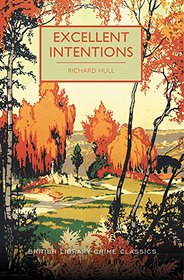Readable, but ultimately a bit disappointing, as it gets bogged down in the wordy minutiae of the trial structure.
As the description says, the gimmick here is that the story of the murder is told from the perspective of the trial of the murderer -- except that for about 2/3s of the novel, the author carefully conceals which of four Prime Suspects are on trial for their life.
So far, so good -- for that first 2/3s. The flashbacks to the murder, and the on the ground investigation by Inspector Fenby of Scotland Yard are nicely done, with a waspish sense of humor, and punctuated with brief returns to the trial, and the "now" of the novel, in which Hull gets to amiably spoof the pomposity of of a Prosecution barrister who is very full of himself, a judge who has seen it all and not inclined to let the lawyers before him get away with any nonsense, a Jury Foreman who is not quite as clever as he thinks he is, and the well-meaning confusion of witnesses who know what they saw, and have firm opinions about what it all means.
Where it all begins to fall flat is when Hull gives up on his clever wheeze, and shifts entirely to the trial-- and it gets very wordy, and just not as interesting. There's a nice twist at the end, but it feels lost in all the verbiage.
As the description says, the gimmick here is that the story of the murder is told from the perspective of the trial of the murderer -- except that for about 2/3s of the novel, the author carefully conceals which of four Prime Suspects are on trial for their life.
So far, so good -- for that first 2/3s. The flashbacks to the murder, and the on the ground investigation by Inspector Fenby of Scotland Yard are nicely done, with a waspish sense of humor, and punctuated with brief returns to the trial, and the "now" of the novel, in which Hull gets to amiably spoof the pomposity of of a Prosecution barrister who is very full of himself, a judge who has seen it all and not inclined to let the lawyers before him get away with any nonsense, a Jury Foreman who is not quite as clever as he thinks he is, and the well-meaning confusion of witnesses who know what they saw, and have firm opinions about what it all means.
Where it all begins to fall flat is when Hull gives up on his clever wheeze, and shifts entirely to the trial-- and it gets very wordy, and just not as interesting. There's a nice twist at the end, but it feels lost in all the verbiage.
Although the hook of not knowing who is on trial for the murder is an interesting one, it is unneeded (after all, most mysteries don't tell you the culprit right away). The writing is fine, and once the initial crime has happened, the story alternates between the trial and the dogged questioning by the police inspector. Not exactly a page turner, but an ok way to pass some time. (One gripe is the lack of short chapters giving a reader a sensible place to put the book down for the night.)




